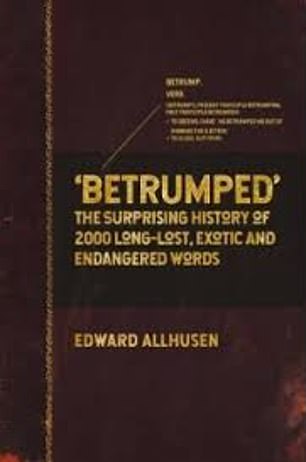A writer has compiled a list of over 600 ‘endangered’ words in a bid to save them before they become extinct from the English language.
Many of the words have their origins in the eras of Charles Dickens and Oscar Wilde, while other unflattering Victorian terms would be frowned upon in today’s society.
The extensive list of dying-out words features in Edward Allhusen’s new book Betrumped, which celebrates the evolving English language.
He fears that, unless a concerted effort is made to reintroduce them into daily conversation, some of these words could perish ‘within a generation’.
Mr Allhusen reveals how a hangover was once known as a bout of ‘crapulence’ while an irresistible craving for alcohol was referred to as ‘dipsomania’.
To ‘defenestrate’ was the act of throwing someone out of the window.
A ‘caterwaul’ was a burst of inconsiderate high-pitched screaming, to ‘condiddle’ was to steal and an ‘amanuensis’ was a literary assistant who took dictation.
An awkward youth experiencing a difficult transition from childhood to adulthood was a ‘hobbledehoy’.
Other words identified by Mr Allhusen which are more common but on their way out include a ‘juggins’ to describe a gullible person.
A large nose was a ‘conk’, to depart quickly was ‘to vamoose’ and someone who attached undeserved importance to a matter was ‘pettifogging’.
A grovelling servant was a ‘lickspittle’, a bossy woman was a ‘harridan’ and one prone to flirtation was a ‘fizgig’.
Acts of stupidity saw someone labelled a ‘ignoramus’ and ‘nincompoop’, and things which didn’t make sense were ‘higgledy-piggledy’.
Indecisive people were said to ‘shilly-shally’, while a loud exclamation of surprise was termed a ‘gadzook’.
A working class woman with promiscuous habits was commonly referred to as a ‘trollop’, while causing an uproar was creating a ‘rumpus’.
As well as listing endangered words, Mr Allhusen has also highlighted how the meaning of words has evolved over the past two and a half centuries.
He studied the seminal 1755 book by Samuel Johnson, ‘A Dictionary of the English Language’ to see which words have survived to this day and how their meanings have changed.
In that edition, he was intrigued to find the term ‘betrump’, which was defined as to deceive, to cheat or to evade by guile.
The meaning of other words have changed completely – now associated with cricket, the word ‘innings’ once meant land reclaimed from the sea.
In total, Mr Allhusen has studied over 3,000 words for his book which have their origins in over 100 different languages – charting how they came to be adopted into the English lexicon.
The former publisher, 70, from Devon, said his list is a ‘personal selection’ rather than an ‘academic approach’ and it is conceivable some of these words are still being used, albeit on a limited scale.
Betrumped, The Surprising History of 3,000 Long Lost, Exotic and Endangered Words, by Edward Allhusen, is published by Amberley and costs £14.99. (By DailyMail)




